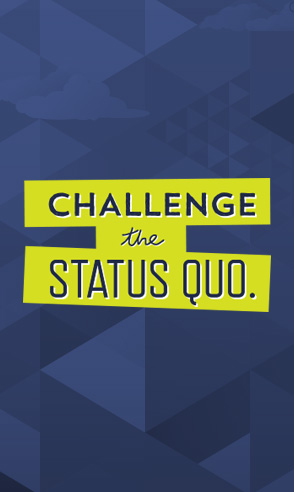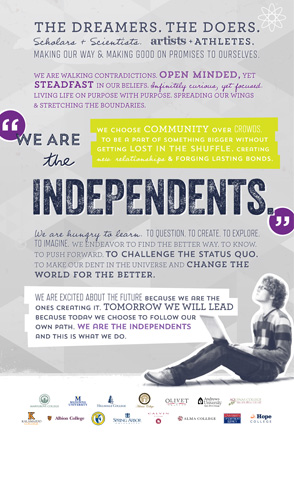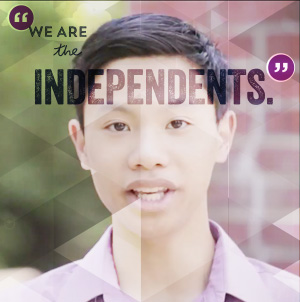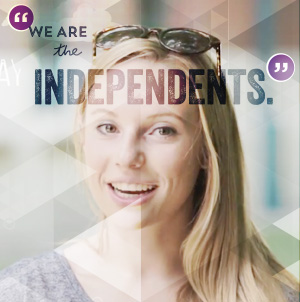Archive for
Kalamazoo Promise Makes Private Education Within Reach
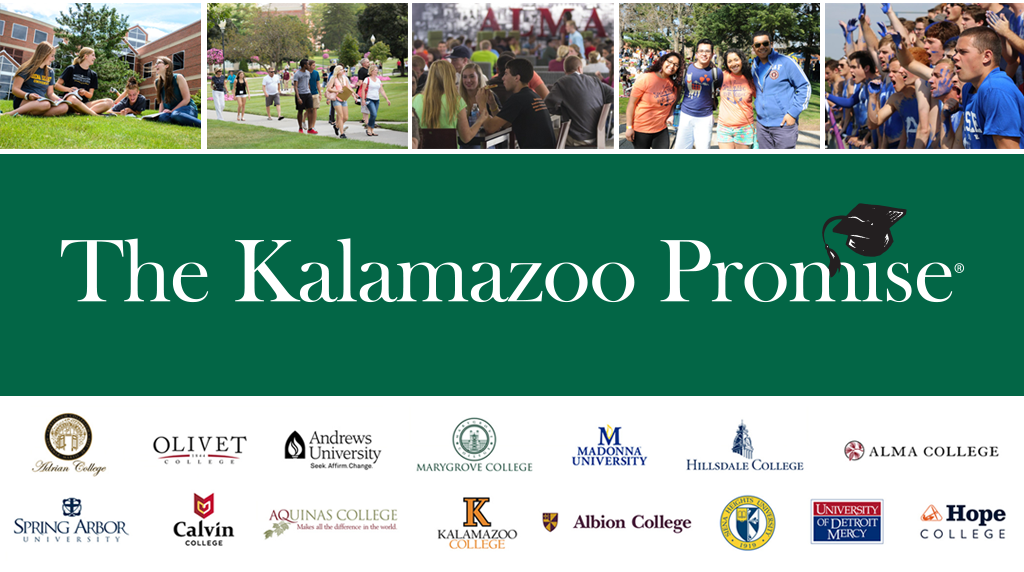
Almost everyone nowadays can cite scary statistics when it comes to the cost of college education.
Nationwide, the average annual tuition at private schools has more than tripled in 30 years jumping to $32,405 this year, according to inflation-adjusted statistics from the College Board.
But the cost of an elite private school education is nothing for students in Kalamazoo public schools.
You read that right.
The cost of Michigan’s 15 independent colleges and universities is zero for students who graduated from Kalamazoo Public Schools and attended since kindergarten. Graduates who attended since at least seventh grade will receive 75 percent of their tuition.
The Kalamazoo Promise is a revolutionary program that is changing lives and putting college in reach for 5,000 eligible graduates since it was launched and funded by anonymous donors in 2005.
The schools now send 85 percent of students to college, whose graduates can expect to earn $1 million more over their lifetime than peers whose education stopped at high school.
And what an education they can get, especially at Michigan’s independents: Adrian College, Albion College, Alma College, Aquinas College, Calvin College, Hillsdale College, Hope College, Kalamazoo College, Marygrove College, Olivet College, the University of Detroit Mercy, Andrews University, Madonna University, Siena Heights University and Spring Arbor University.
The schools pride themselves on helping students forge their own path. Classes are taught by professors, not teaching assistants, with average class sizes of just 17.5 students.
The independents open doors to a host of careers, from business and engineering to education and nursing, supported by a nurturing network of alumni who have become leaders in their fields.
And the independent colleges look like the world around them. One in 4 students at Michigan private colleges and universities is African American, American Indian, Asian, Hispanic or Latino.
Be bold. Be different. Go independent.
Marygrove College Offers New Program to Improve Police Relations
These are tense times. Snipers are killing police. Unarmed motorists are dying at the hands of police. Common ground between law enforcement and African Americans can seem elusive.
The answer, as it always does, begins with education. And as they always have, Michigan’s 15 independent colleges and universities are stepping forward to lead the dialogue toward solutions.
This week, Marygrove College announced a new online bachelor of arts in criminal justice degree. What makes it unique is its approach.
Rather than focusing on punishment, it emphasizes what’s known as restorative justice, an approach that focuses on the needs of both victims and offenders and how crime affects community.
“In this time of crisis, where there is distrust between law enforcement and the community,” Marygrove College Provost Sally Welch recently told Hometown Life, “our institution is prepared to help bring about peace and reconciliation through its online bachelor of arts degree in criminal justice based on Restorative Justice principles.”
The program is aimed at working criminal justice professions and accepting applications for fall semester that starts Sept. 6.
The program’s intent is broader than simply preparing students for careers. It does that spectacularly. But its goal is to also change the mindset that perpetuates distrust between police and communities, taking a holistic approach to crime rather than simply locking people up.
Victim-centered, restorative justice gives victims and offenders the opportunity to take steps to repair harm to communities. Because crime isn’t simply an attack on individuals. It’s an affront to communities.
And community is at the core of Marygrove College and the other Michigan independents. Their mission is to lift all boats, preparing students for awesome careers and preparing them to help the world at large.
Community infuses everything about the independents. Unlike big schools, class sizes are small and taught by incredibly faculty who help students forge their own path.
Students form lifelong bonds with professors, as well as an impassioned, caring network of alumni who help after graduation.
And despite what you may have heard, independents are often less expensive and boast higher four-year graduation rates that big state schools.
Be bold. Be different. Go independent.
Marygrove Writer’s House to Help Save a Piece of Detroit
Classroom learning is great. But lessons don’t stop outside lecture halls. They’re about making the world around you better.
Marygrove College is fusing academics with urban revitalization, transforming the ramshackle home of a Pulitzer Prize winner into a writer’s residence and literary center and helping improve a small corner of Detroit.
It’s called the Tuxedo Project. And it’s pretty cool.
It began when Stephen Henderson, editorial page editor of The Detroit Free Press who won journalism’s biggest prize for his columns on the city’s bankruptcy, kept driving past his childhood home at 7124 Tuxedo.
Like some 40,000 other homes in Detroit, it was in sorry shape: Stripped of all copper and piping by vandals, ransacked, plundered and left to rot.
“‘Wreck’ doesn’t come close to describing the interior,” Henderson wrote
The plan: Save the house and recruit a fellow to live there, help literacy in the neighborhood and teach at Marygrove. This week, the Knight Foundation awarded Marygrove a grant for $150,000 for the effort.
“The Tuxedo Project provides a tangible way to link our discipline, our students, and the larger community in collaborative revitalization,” said Darcy L. Brandel, associate professor of English and chair of English and modern languages at Marygrove College.
“We are honored to share what we know about reading, writing, and storytelling in ways the neighborhood residents find most useful. We are very excited to move forward.”
Marygrove won the grant over 1,000 applicants and 70 finalists. The college’s interim president, James F. Birge, said project well help a part of the Detroit that has yet to benefit from its downtown comeback.
“The area … is not one of the neighborhoods currently attracting investment or experiencing growth,” he said. “The residents in this area, like the 5,000 residents in the area just outside our campus gate —some of whom are students at our institution—are looking for local leaders and anchor institutions like ours to do their part in revitalizing the community.”
That’s because leadership, helping others and commitment to community help define Marygrove and Michigan’s 15 independent colleges and universities.
Unlike big state institutions, students at Marygrove and other independents actually know their professors.
Professors pride themselves on working closely with students to help them forge their own path, buck conventional wisdom and find a new way.
It’s an experience that simply isn’t available at traditional universities. And despite what you may have heard, independents are often less expensive and boast higher four-year graduation rates than four-year institutions.
Be bold. Be different. Go independent.
Marygrove’s Rita Fields beats the odds, becomes an inspiration
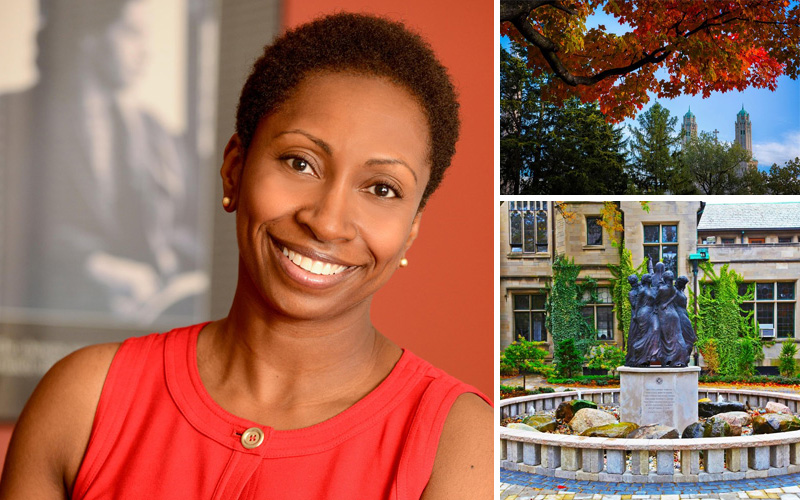
Rita Fields could have given up. Or been a statistic.
Instead, she became an inspiration.
A single mother at 17, she was raised by a schizophrenic violent mother. For a spell she was homeless, literally eating food from a dumpster and sleeping behind a Kroger. Somehow, through prayer and grit, she persevered to complete her GED and pressed forth to provide a better life for her son, Alaric.
Fields knew that life went through college. Most weren’t willing to accommodate her.
But Marygrove College in Detroit saw something in Fields, offering her financial aid and other support.
She flourished, earning a double major in psychology and English, winning honors and setting a school record by taking 10 classes in one semester and received in A in each. At her side throughout the incredible journey was Alaric, riding the bus with her and sitting at her side a classes.
“At Marygrove, I felt valued. I was able to connect with people and interact with professors who cared deeply about their students and wanted to support them,” Fields says.
“The program was tailored to support the working individual — so the ease of access was tremendously important for me.”
Today, she is known as Dr. Fields and is a business professor at another MCA member school – Madonna University.
She’ll share her story Thursday at TEDxDetroit, a daylong conference devoted to big ideas in technology, entertainment and design at the Fox Theatre in Detroit.
“Marygrove greatly contributed to the person that I have become. My education not only gave me knowledge, it also largely rebuilt my shattered self-esteem,” Fields says.
It’s a heart-warming story and there are many more like it at Marygrove and Michigan’s top 15 independent colleges and universities.
The schools take pride in finding and nurturing promise. Purposefully small, they prefer community over crowds. Unlike big state schools that pack hundreds into lecture halls, classes are small so faculty can work individually with students.
Like Fields, the path may not always be straight. But it’s one that leads to great things.
And despite what you may have heard, independents are often less expensive and boast higher four-year graduation rates than four-year institutions.
Be bold. Be different. Go independent.
Marygrove College bucks convention, lowers tuition
It’s that time of year again. Colleges and universities are raising tuitions.
Big state schools say they have no choice as government support continues to decrease. Five percent one year. Eight percent the next. It’s been going for so many years that the cost of higher education has increased 538 percent since 1985.
That’s why Marygrove College made headlines — and turned heads — recently when it lowered tuition for a third of its students.
You read that right. The Detroit college dropped tuition 16.5 percent for part-time students.
“The whole question of affordability and access is huge nationally and it is exponentially so for us, because we serve so many students who have a disproportionately high need,” said Marygrove’s outgoing president, David J. Fike.
It may have been a shocking move. But it’s in line with the traditions and values at Michigan’s top 15 independent colleges and universities.
Keeping costs down and providing ample financial aid to students is just one of many differences with big public schools.
Almost all of Marygrove’s students who maintain B averages receive financial aid. It’s a similar story at most other Michigan independents, where more than 93 percent of students receive aid. That brings the costs of a world-class college within reach — a priceless education that is affordable.
Cost is just one of many differences. So are class sizes, which are significantly smaller. And relationships between students and professors, who actually teach classes rather than delegate them to post-graduate teacher assistants.
The schools value community over crowd, allowing students to forge their own path to success. And they boast graduation rates that are superior to big public universities.
Be bold. Be different. Go independent.
It’s Graduation (and Commencement Speaker) Season!

It’s spring and flowers aren’t the only thing in bloom. So are big ideas and promising futures.
All will be on display during commencement ceremonies at Michigan’s top 15 colleges and universities. Before graduates head out to chart their own paths in the world, they’ll hear insight from speakers who’ve blazed trails before them.
Like the colleges themselves, the commencement speakers are an eclectic and impassioned mix of the best and brightest from the worlds of business, theology, journalism, law and politics.
U.S. Sen. Gary Peters kicked off the list of luminaries on April 18, by telling Alma College graduates to make “democracy work” by participating in public speaker. The 1980 graduate of Alma received an honorary degree and stressed that graduates need to “keep the promise of the American dream alive.”
On May 3, William K. Hall is expected to share his decades of wisdom in business at Adrian College. Respected worldwide as an entrepreneur, Mr. Hall is a former Adrian resident who is founder and CEO of Procyon Technologies, an Illinois company that consults healthcare companies. Over the years, Mr. Hall has been a senior executive or board member of some of America’s biggest companies, including Fruit of the Loom and Cummins Inc.
Less than a week later, on May 9, two prominent business executives will don caps and gowns and address graduates on either side of Michigan. Both have unique perspectives as minority women.
Candace Matthews is addressing Aquinas College, less than a year after she was named regional president of the Americas for Amway. The job puts her in charge of overseeing the direct mail sales giant’s operations in North and South America. Just a few years ago, she was in charge of the American division of makeup giant L’Oreal USA.
Across the state, Lizabeth Ardisana will speak to graduates of Marygrove College in Detroit. She is co-founder of ASG Renaissance, a technical and communications firm, and a trailblazer: The first woman elected to chair the Michigan Hispanic Chamber of Commerce and the first minority-owned service supplier to receive Ford Motor Co.’s Q1 award.
On June 14, Pulitzer Prize winner David Finkel will bring his perspective as a war correspondent and Middle East expert to Kalamazoo College. The Wall Street Journal reporter won journalism’s biggest prize for his work on Yemen and is the author of the Iraq war book “The Good Soldiers.”
Other commencement speakers include religious leaders, academics, lawmakers and judges. They’re a diverse group, to be sure, but what else would you expect from Michigan independent colleges and universities.
| College | Date | Speaker | About Speaker |
|---|---|---|---|
| Adrian College | 5/3 | William K. Hall | Former resident of Adrian, Michigan is a general partner of Procyon Advisors LLP |
| Albion College | 5/9 | Faith Fowler ’81 | Senior Pastor, Cass Community United Methodist and Executive Director, Cass Community Social Services |
| Alma College | 4/18 | Sen. Gary Peters ’80 | U.S. Senator |
| Andrews University | 5/3 | Humberto M. Rasi | Special Projects, Department of Education, General Conference of Seventh-Day Adventists |
| Aquinas College | 5/9 | Candace Matthews | Regional President of the Americas for Amway |
| Calvin College | 5/23 | Mark Labberton | President, Fuller Theological Seminary |
| Hillsdale College | 5/9 | Michael Ward | Senior Research Fellow, Blackfriars Hall in the University of Oxford; Author |
| Hope College | 5/3 | Tim Schoonveld | Assistant Professor of Kinesiology and Athletics Co-Director, Hope College |
| Kalamazoo College | 6/14 | David Finkel | National Enterprise Editor, Washington Post; Pulitzer Prize-winning writer and war correspondent |
| Madonna University | 5/10 | Leonard Charles Suchyta | Former Trustee and Chairman at Madonna; Special Counsel, Hunton & Williams |
| Madonna University | 5/10 | Archbishop Allen Vigneron | Archbishop of the Detroit Archdiocese |
| Marygrove College | 5/9 | Lizabeth Ardisana | Chief Executive Officer, ASG Renaissance |
| Olivet College | 5/16 | Allison Ullrich | Student from the graduating class |
| Siena Heights University | 5/2 | Caity Benham & Lacie Hill | Student from the graduating class – College of Professional Studies |
| Siena Heights University | 5/3 | Alisha Bond | Student from the graduating class – College of Arts and Science |
| Siena Heights University | 5/9 | Matt Konopinski | Student from the graduating class – Graduate College |
| Spring Arbor University | 5/16 | Tim Walberg | U.S. Representative |
| University of Detroit Mercy | 5/9 | Judge Damon J. Keith | Senior Judge for the United States Court of Appeals for the Sixth Circuit |
Purposefully small, these independent schools are home to free thinkers whose ideas are allowed to blossom in ways that aren’t always possible at big institutions. Often less expensive than public institutions, the independents boast higher four-year graduation rates and smaller class sizes for a truly unique and affordable experience.
Be bold. Be different. Go independent.







